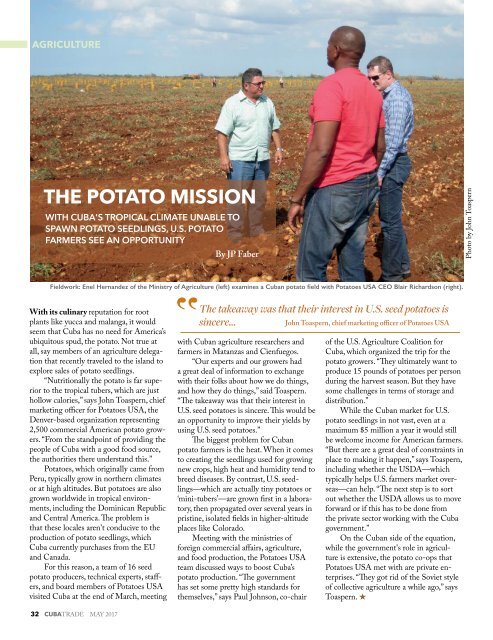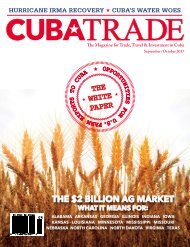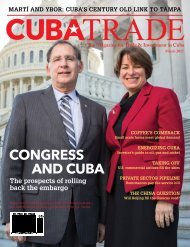CubaTrade-May2017-Flipbook
You also want an ePaper? Increase the reach of your titles
YUMPU automatically turns print PDFs into web optimized ePapers that Google loves.
AGRICULTURE<br />
THE POTATO MISSION<br />
WITH CUBA'S TROPICAL CLIMATE UNABLE TO<br />
SPAWN POTATO SEEDLINGS, U.S. POTATO<br />
FARMERS SEE AN OPPORTUNITY<br />
By JP Faber<br />
Photo by John Toaspern<br />
Fieldwork: Enel Hernandez of the Ministry of Agriculture (left) examines a Cuban potato field with Potatoes USA CEO Blair Richardson (right).<br />
With its culinary reputation for root<br />
plants like yucca and malanga, it would<br />
seem that Cuba has no need for America’s<br />
ubiquitous spud, the potato. Not true at<br />
all, say members of an agriculture delegation<br />
that recently traveled to the island to<br />
explore sales of potato seedlings.<br />
“Nutritionally the potato is far superior<br />
to the tropical tubers, which are just<br />
hollow calories,” says John Toaspern, chief<br />
marketing officer for Potatoes USA, the<br />
Denver-based organization representing<br />
2,500 commercial American potato growers.<br />
“From the standpoint of providing the<br />
people of Cuba with a good food source,<br />
the authorities there understand this.”<br />
Potatoes, which originally came from<br />
Peru, typically grow in northern climates<br />
or at high altitudes. But potatoes are also<br />
grown worldwide in tropical environments,<br />
including the Dominican Republic<br />
and Central America. The problem is<br />
that these locales aren't conducive to the<br />
production of potato seedlings, which<br />
Cuba currently purchases from the EU<br />
and Canada.<br />
For this reason, a team of 16 seed<br />
potato producers, technical experts, staffers,<br />
and board members of Potatoes USA<br />
visited Cuba at the end of March, meeting<br />
The takeaway was that their interest in U.S. seed potatoes is<br />
sincere...<br />
John Toaspern, chief marketing officer of Potatoes USA<br />
with Cuban agriculture researchers and<br />
farmers in Matanzas and Cienfuegos.<br />
“Our experts and our growers had<br />
a great deal of information to exchange<br />
with their folks about how we do things,<br />
and how they do things,” said Toaspern.<br />
“The takeaway was that their interest in<br />
U.S. seed potatoes is sincere. This would be<br />
an opportunity to improve their yields by<br />
using U.S. seed potatoes.”<br />
The biggest problem for Cuban<br />
potato farmers is the heat. When it comes<br />
to creating the seedlings used for growing<br />
new crops, high heat and humidity tend to<br />
breed diseases. By contrast, U.S. seedlings—which<br />
are actually tiny potatoes or<br />
‘mini-tubers’—are grown first in a laboratory,<br />
then propagated over several years in<br />
pristine, isolated fields in higher-altitude<br />
places like Colorado.<br />
Meeting with the ministries of<br />
foreign commercial affairs, agriculture,<br />
and food production, the Potatoes USA<br />
team discussed ways to boost Cuba’s<br />
potato production. “The government<br />
has set some pretty high standards for<br />
themselves,” says Paul Johnson, co-chair<br />
of the U.S. Agriculture Coalition for<br />
Cuba, which organized the trip for the<br />
potato growers. “They ultimately want to<br />
produce 15 pounds of potatoes per person<br />
during the harvest season. But they have<br />
some challenges in terms of storage and<br />
distribution.”<br />
While the Cuban market for U.S.<br />
potato seedlings in not vast, even at a<br />
maximum $5 million a year it would still<br />
be welcome income for American farmers.<br />
“But there are a great deal of constraints in<br />
place to making it happen,” says Toaspern,<br />
including whether the USDA—which<br />
typically helps U.S. farmers market overseas—can<br />
help. “The next step is to sort<br />
out whether the USDA allows us to move<br />
forward or if this has to be done from<br />
the private sector working with the Cuba<br />
government.”<br />
On the Cuban side of the equation,<br />
while the government's role in agriculture<br />
is extensive, the potato co-ops that<br />
Potatoes USA met with are private enterprises.<br />
“They got rid of the Soviet style<br />
of collective agriculture a while ago,” says<br />
Toaspern. H<br />
32 CUBATRADE MAY 2017
















